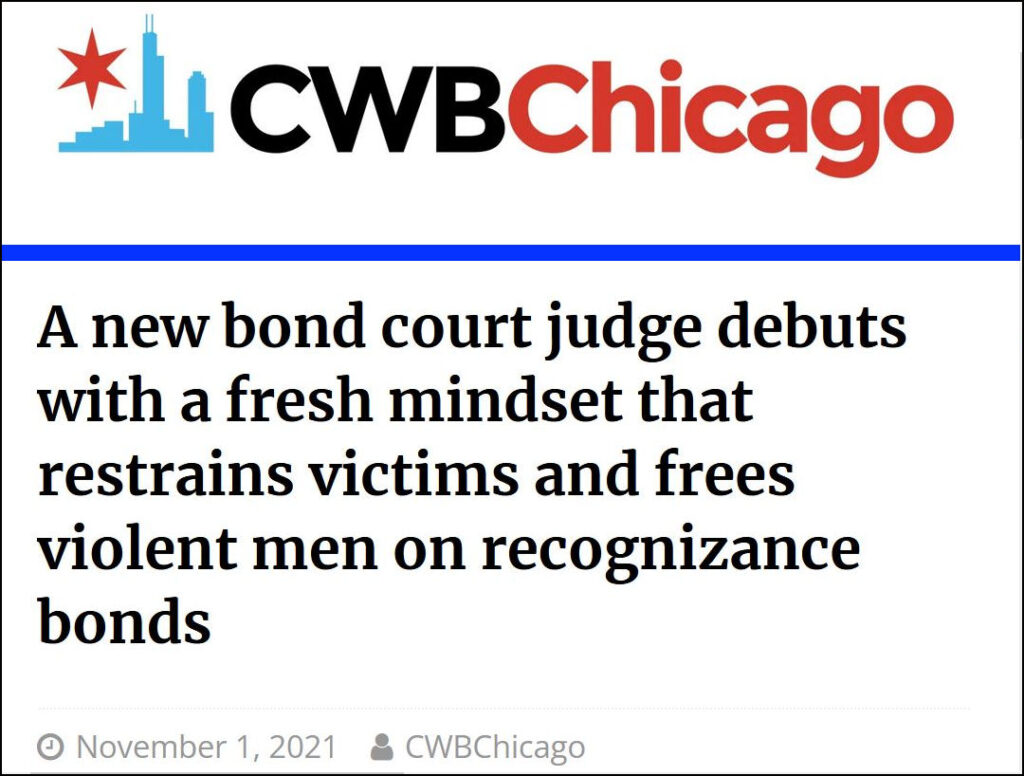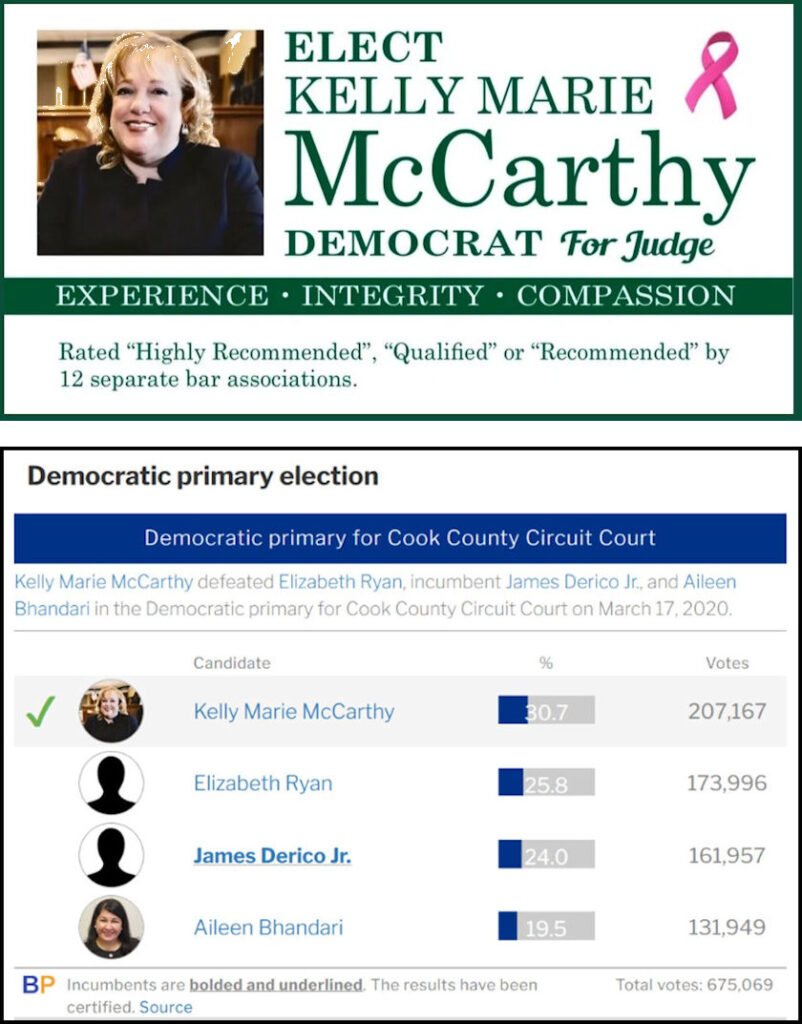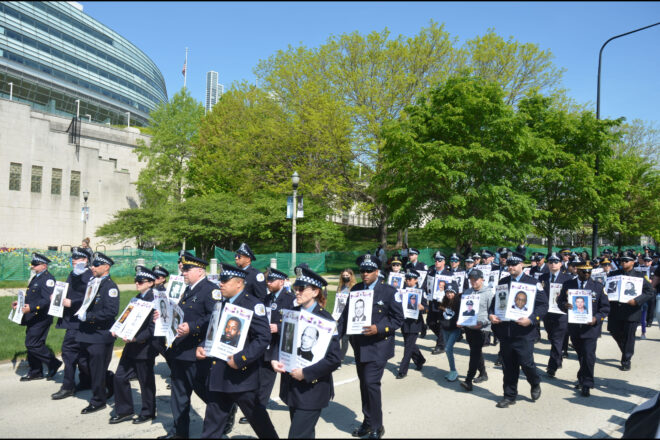When Alice followed a rabbit down a hole, she ended up in Wonderland, a bizarre, mixed up place. Among the characters she met was the Cheshire Cat, who told her that everyone in Wonderland was “mad,” crazy, including her. When Alice asked how the cat knew she was “mad,” he responded: “You must be… or you wouldn’t have come here.” More than the king, the Queen of Hearts ruled in Wonderland. The queen sought executions before trials, and sentences before verdicts. The Queen of Hearts would likely agree that the lawlessness problem in Wonderland Chicago is caused by its victims. But in a sane world, a justice system that does not have victims as a priority is fundamentally unjust. But if, up is down and down is up, then welcome Alice to Wonderland Chicago. Lawlessness is madness.
Estimated reading time: 14 minutes
Wonderland Chicago Victims Not a Priority
Without question, activists have sought to dramatically reduce incarceration as a response to crime, even violent crime. They have placed an even greater focus on eliminating pre-trial detention in nearly all circumstances. In Cook County, Illinois, activists are not just outside the system, they are active within the justice system. As Secure 1776 has noted previously, the county’s lead prosecutor, Kim Foxx, highlights her “being a leader on bond reform“ on her official office profile page. In an article posted on the Cook County Public Defender’s Office website, Ms. Foxx and the county’s Public Defender, Sharone Mitchell Jr., are described as allies in their justice reform efforts. Well, last Friday, 29 October 2021, Judge Kelly Marie McCarthy, went further than even the county’s two leading criminal attorneys may have imagined. Judge McCarthy signaled a Wonderland Chicago approach to felony bond court.

As reported by CWB Chicago, last week, Judge McCarthy made her debut as a presiding judge in Cook County’s Bond Court. Much like Chicago’s city council, the display in court was less remarkable and more spectacle. There were several Wonderland Chicago moments, as an easy pathway for release back into the community was provided to one violent offender after the other. Of 27 felony defendants who came before the judge on Friday, she released 22 of them on their own recognizance. Even when prosecutors from Ms. Foxx’s office urged otherwise. But the Queen of Hearts would have been most pleased when Judge McCarthy took special note of the victims in two separate cases.
Conditions of Release for a Victim?
Imagine, your sister, daughter, or mother is a victim of armed street robbery. She calls police reports the crime. She is determined not to be a silent victim, and she explores social media for people she knows live in her area. She finds the Facebook profile of one of her attackers. She sends a Facebook message to that person, and he agrees to return some of her property. That person is then arrested for armed robbery and brought before Judge McCarthy in felony bond court. Prosecutors ask that the offender be held without bond, as he is a danger to the community. Pre-trial services personnel advise, that if released, the offender should be given “maximum conditions.” The judge then demonstrates the power and wisdom of the Queen of Hearts.
First, release the offender on his own recognizance, and with electronic monitoring (a topic for another day). Second, when asked by prosecutor for a condition of pre-trial release requiring the offender to stay away from the victim, turn the court’s attention to the victim. Direct the prosecutor to prepare an order directing the victim to stay away from the offender. That is true Wonderland Chicago logic. If only the court could order all victims to stay away from all offenders, there would be no crime. The impossible solved in a single bond court hearing.
It bears noting that there was no allegation from anyone, not even the assistant public defender representing the offender, that the victim posed any danger to the gunman who robbed her. In Hadleyville, gunman roam the community’s streets without fear. This was new. In Wonderland, courts order victims to stay away from gunman. Wonderland nonsensical brilliance on spectacular display. When Assistant State’s Attorney John Gnilka attempted to advise that as a prosecutor he has no authority to set conditions on a victim, Judge McCarthy was not dissuaded. She ordered that the victim be compelled to appear in court this coming week and served with a no contact order. In Wonderland Chicago, crime victims stand accused.
Strangling Your Pregnant Girlfriend?
Imagine your 17-year-old sister is six-months pregnant, and she has a violent boyfriend. Imagine she has a cat. Imagine the cat knocks over some treasured belonging of the boyfriend. In another case before Judge McCarthy on Friday, such a boyfriend cruelly beat and suffocated his pregnant girlfriend. CWB Chicago provided the following summary of the attack that the prosecutor presented to Judge McCarthy:
“When she screamed for him to stop suffocating her, the man put a pillow over her mouth, shoved her face into a couch, and even shoved his fingers down her throat to make her stop, according to the allegations. That was just the beginning. He pushed her into the TV and broke it. He dragged her into a bedroom closet, where he beat her and suffocated her until she urinated on herself. He rubbed her in the waste, dragged her into a bathroom, and kicked her as she lay on the floor, unable to move, (Assistant States Attorney) Gnilka said. While she was incapacitated, she could hear the man choking her cats.”
“He returned to the bathroom with a mop, which he used to hit her before he placed a hammer around her neck and used it to lift her off the ground, Gnilka alleged. The man allegedly put her down after she started to black out from a lack of oxygen. Next, he dragged her back to the bedroom closet, threw the mop at her, and told her to clean up her “mess,” Gnilka alleged. Another suffocation attempt followed, he said. When the woman was finally able to get up, the man punched and kicked her to the ground, then stepped on her stomach and stomped on her chest, Gnilka continued. Eventually, the woman was able to slip out of the apartment when the man took a break to look at his phone.“
The offender was charged by prosecutors with attempted murder, aggravated battery, and aggravated battery of a pregnant woman. The state asked that the offender be held without bond. Judge McCarthy noted that the fight was for “little or no reason.” Still, she rejected the hold-in-custody request, and she set bond at $100,000. Upon posting $10,000 in bond the offender will be released from custody with electronic monitoring. In explaining her ruling, the judge referenced the unborn victim stating, “there is still a heartbeat, so that is good.” She added that she saw “no other indicators of violence.” In Wonderland Chicago, victims who live are not a priority. It is as yet unclear whether the ones who die are. Again, if all victims would just stay away from all offenders, lawlessness in Chicago would end.
A Strangulation Lesson for Judge McCarthy
Cops ask questions, and they know a few things. One of them is that strangulation is a particularly telling form of attack. Even when the strangulation is non-fatal, the risks of repeated and escalating violence are significant. In 2007, the U.S. Department of Health and Human Services released a study entitled, “Non-fatal strangulation is an important risk factor for homicide of women.” The study found that in comparing domestic violence methods, incidents involving strangulation result in a death at nearly five times the rate for other forms of physical abuse. Quoting further from another key finding from that study:
“Prior non-fatal strangulation was associated with greater than six-fold odds (OR 6.70, 95% CI 3.91–11.49) of becoming an attempted homicide, and over seven-fold odds (OR 7.48, 95% CI 4.53–12.35) of becoming a completed homicide. These results show non-fatal strangulation as an important risk factor for homicide of women, underscoring the need to screen for non-fatal strangulation when assessing abused women in emergency department settings.“
It would seem that such is good advice beyond emergency rooms. Domestic violence intervention workers, police investigators, prosecutors, and judges, even those in bond court, should be taking note as well. Women who have been strangled by their domestic partner are at a substantially greater risk of becoming a homicide victim by the hands of the same attacker. The offender from Friday’s bond hearing is a clear danger to his girlfriend, and her unborn child. Such is the case even in Wonderland Chicago.
Judge Kelly Marie McCarthy, Some Background
Kelly Marie McCarthy was elected to the Cook County Circuit Court on 3 November 2020. She previously sought election as a judge in 2008, but was unsuccessful. For the 17 years prior to her 2020 election, she was a member of the Cook County Public Defender’s Office. At the time of her election she was a division supervisor within that office.

Those from Chicago know that Republican Party candidates rarely win city and county offices. As such, the Democrat Party primary is the more relevant contest of who will and who will not be elected to office in Cook County. McCarthy faced three rivals in her judicial election primary bid. In an Illinois primary election, the “winning” candidate does not need to gather a majority of the votes cast. The candidate need only garner the most votes among all candidates running. A native of Berwyn, Illinois, McCarthy was elected with 37% of the March 2020 Democrats voting in their primary. There was no Republican candidate for her judicial position in the November 2020 general election. As the winner of the Democrat primary, she was by default the winner of the general election.
Ballotpedia Candidate Survey Questions
For the 2020 election cycle, candidate and supervising assistant public defender, Kelly Marie McCarthy participated in Ballotpedia’s candidate survey. Here below are a few of the survey questions and her responses:
- What is something that has been a struggle in your life?
- “Being the first in my family to attend college it was a struggle to get my degree without coming from a wealthy background. Since then I have struggled to ensure there was fairness and equity in the legal system.”
- Is there a book, essay, film, or something else you would recommend to someone who wants to understand your political philosophy?
- “No.”
- How would you describe your legal philosophy?
- “To treat each person with respect and dignity.”
- What qualities do you possess that you believe would make you a successful officeholder?
- “Integrity Experience Compassion.”
- What legacy would you like to leave?
- “Respect for the judiciary.”
- Why are you running for this particular court seat?
- “I have the knowledge and experience. But the main reason is that I will be fair to all sides and treat people with dignity and respect.”
- What is your primary concern about today’s legal system in your state?
- “The perception that the legal system isn’t fair.”
Secure 1776 applauds Judge McCarthy’s concern for fairness and her awareness that respect for the judiciary is important. However, none of her survey responses made any reference to crime victims or public safety. We would ask the judge the following additional questions. What are her thoughts regarding the judiciary’s responsibilities to protect victims? Did her bonding decisions this past Friday place victims as a priority within her courtroom? Is she “fair” to the victims whose cases come before her? Does she treat crime victims with “respect and dignity.” Do her decisions foster public safety?
Clearly, “the highest priority” of the justice system is supposed to be “justice.” Without question, such demands that the system follow the law and respect the Constitutional rights of all those who are accused of crimes. However, we at Secure 1776 are among those who hold that for a justice system to be truly “just,” victims must at least be “a priority.” Failing to keep victims as a key priority in the justice system is a dive down a dangerous rabbit hole.
A Quick Look at Judge McCarthy’s Campaign Financial Reports
In conducting our review for this posting, Secure 1776 examined the campaign financial reports completed by the “Committee to Elect Kelly Marie McCarthy.” The reports were approved by the candidate and submitted to the Illinois State Board of Elections. We draw forward the following observations:
- In preparation for the 2020 election cycle, the committee was reactivated in June 2019. Eric M. Sloss, Jr. was identified as the committee chair and treasurer. According to public records, during 2020, Sloss was an Investigator 2 for the Cook County Public Defender’s Office. His 2020 annual salary was $66,743.04.
- During 2020, the candidate, Kelly Marie McCarthy was an Assistant Public Defender Supervisor for the Cook County Public Defender’s Office, with an annual salary of $142,045.28. There is no filing indicating whether or not the candidate was a supervisor for the committee chair and treasurer at the Cook County Public Defender’s Office.
- The initial filing showed that on 5 June 2019 Sloss loaned the committee $70,000.
- Also on 5 June 2019, the candidate sent an email message to an official at the Illinois Board of Elections indicating the filing listing Sloss as the source of the committee loan was an error. The email sought to correct the record to reflect the source of the $70,000 as being the candidate, McCarthy.
- In the next quarterly filing, for 3rd Quarter of 2019, the committee returned a total of $50,000 to McCarthy. $35,000 was returned on 6 August 2019. $5,000 was returned on each of three dates: 13 August, 29 August, and 16 September 2019.
- A 4th Quarter 2019 amended filing showed the candidate both making individual contributions totaling $27,021.74, and receiving back $9,000 toward her outstanding loan to the committee. It should be noted that the filing did not reduce the outstanding debt owed to McCarthy by the repaid $9,000 as it should. The report lists the outstanding debt as 20,358.66. It should have been $11,358.66, given the $9,000 loan repayment during the quarter.
- On 3 February 2020, McCarthy filed a “Notification of Self-Funding” report with the state. The filing does not require her to report what personal sources she drew from and was drawing money to fund her campaign.
- The 1st Quarter 2020 filing showed the candidate contributing $6,101 to her campaign, and also loaning her committee $11,480. This filing does not start with what would have been the correct outstanding loan balance as of the end of the 4th Quarter, $11,358.66. From that point, with the additional loan of $11,480, and no repayments, the new outstanding balance as of the end of the 1st Quarter should have been $22,838.66. The filing incorrectly shows $31,838.66.
- The 3rd Quarter 2020 filing showed the committee returned another $1,580 to McCarthy. As with the previous repayments, the outstanding balance was not reduced. The loan balance should have been recorded as $21,258.66. The report continued to incorrectly show $31,838.66 as the amount owed. Relative to the outstanding loan balance, the filings are off by $10,580.
- The final filing was submitted for April 2021, deactivating the committee. The final report showed no cash on hand, and the incorrect outstanding loan balance owed to McCarthy.
- Over the period the campaign committee was active:
- McCarthy contributed $33,122.74 and loaned the committee another $81,838.66. Combined McCarthy transferred into her campaign $114,961.50. This total comprised 98.4% of the money recorded as being received by the campaign.
- The committee also returned $54,381.40 to McCarthy. As such, the final actual net receipts expended on the campaign were $56,271.40. Alice might describe the shifting of funds in and out the committee as “curious.”
- The largest expenditure recipient of the campaign’s funds was the person who served as the committee treasurer of McCarthy’s first campaign. Joanne Angsten received $20,500 for her “campaign work.” The current campaign chair and treasurer, Eric Sloss, Jr. received 2,000 from the committee.
- Legal fees, petition assistance, printing, billboards, and other messaging assistance comprised the bulk of the remaining $33,771.40 in expenditures.
Victims Are at the Center of the Police Mission
Across the country, police officers respond to the calls from crime victims everyday. Working to lessen the risks of becoming a victim, coming to the aid of victims, and seeking justice for victims are at the very center of the police mission. Even as the debate has raged over “criminal justice reform,” the police continue to serve victims. Can the same still be said of the rest of the justice system? How about among those in the nation’s city halls, state legislatures and executive mansions? It is easy to see why cops ask questions.
Would the Cheshire Cat say that everyone in Wonderland Chicago is mad?
In Cook County, Chief Judge Timothy C. Evans sets the judicial assignments. Perhaps the Chief Judge will adjust the felony bond court lineup. Perhaps not.
We are interested in your thoughts, and invite you to comment below.

Copyright Protected | (c) 2021 Secure1776.us – All rights reserved.


Well Judge Kelly Marie McCarthy continues to make an “impression” in Cook County’s Bond Court. CWB Chicago reported how, on 8 January 2022, she seemed confused about the law prohibiting passengers from carrying firearms on their person or in their carry-on bags at airport. The passenger in question was a Chicago Public School teacher — on strike over in-person instruction and Covid. The teacher, Victor Aguilar, was so concerned about Chicago’s public school children missing school – he was headed for a Florida vacation. He was released by Judge McCarthy on his own recognizance. No surprise there.
You cannot forget throwing Governor J.B. Pritzker, Il. State Rep. Justin Slaughter and Il. State Senator Elgie Sims in the mix. Il. State Rep. Justin Slaughter and Il. State Senator Elgie Sims were the “brains” behind House Bill 3653 which was signed into law by Governor Pritzker in Feb. 2021. Besides all the mandates it places on Illinois Law Enforcement, the greatest tragedy of the bill is that it abolishes cash bail for jail release of individuals who have been arrested and are waiting for their case to be heard. This judicial mandate goes into effect Jan. 2023. It looks like Judge McCarthy wants practice before 2023.
More pain (literally) inflicted on the law abiding citizens of Illinois.